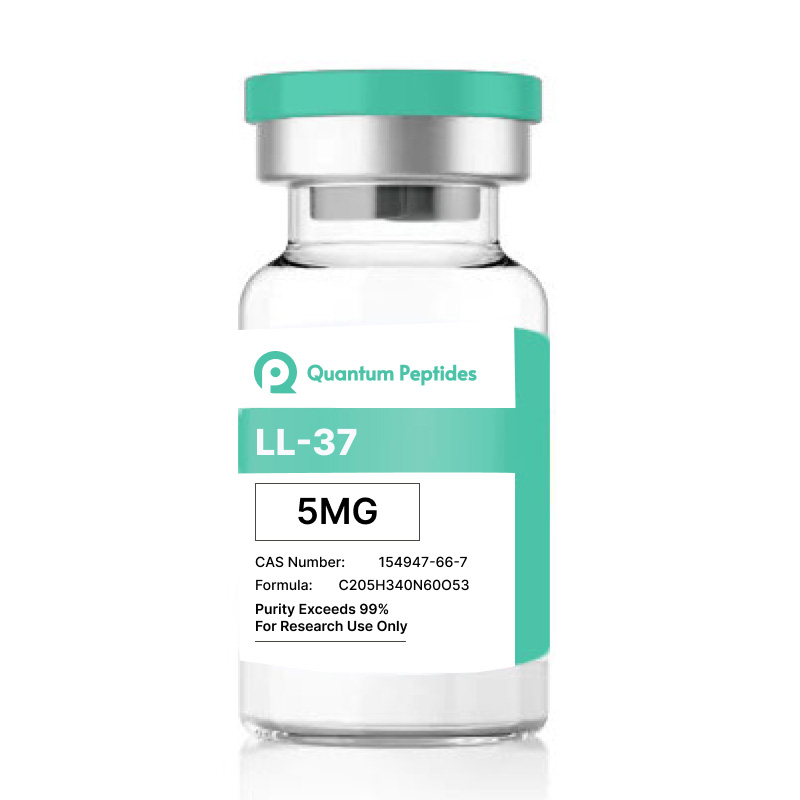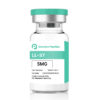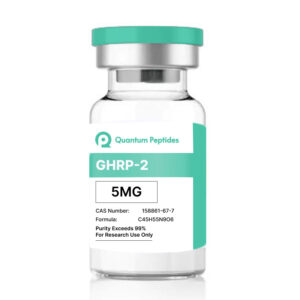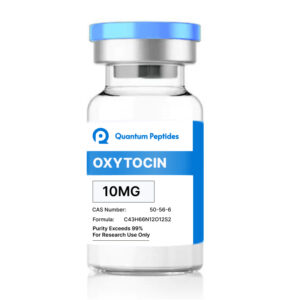LL-37 (5mg)
$84.00
LL-37, as a member of the Cathelicidin family, exhibits antimicrobial, antibacterial, antiviral, and antifungal properties, while demonstrating anti-inflammatory effects. Additionally, studies suggest its potential in combating specific types of tumors and promoting angiogenesis in certain contexts.
LL-37 Peptide and Immune Response
LL-37, commonly referred to as Cathelicidin, is a positively charged peptide consisting of 37 amino acids, prominently present in neutrophils.(1) The peptide is generated through the extracellular cleavage of hCAP18 proteins induced by protease enzymes. Investigated for its potential role in bolstering the immune system, LL-37 displays a propensity to form clusters and lipid bilayers, offering resistance to enzymatic degradation and potentially contributing to immune defense mechanisms.(1)
Overview
Antimicrobial peptides are designed with the capability to combat bacteria, fungi, and select virus strains. These peptides exhibit a non-specific interaction with their targets, leading researchers to posit that the introduction of these peptides may prevent pathogens from developing resistance.(2)
One such peptide, LL-37, is identified as an α-helical peptide essential for maintaining immunity against various microbes.(3) A study(4) aimed to elucidate the peptide’s function involved creating a peptide model, assuming direct interaction with the bacterial membrane. Findings suggested an initial electrostatic interaction with lipids on the bacterial membrane, followed by lateral diffusion and subsequent peptide assembly on the membrane. This proposed interaction could result in membrane interference and the eventual degradation of the bacterial cell.
Numerous studies explore different hypotheses on how LL-37 interacts with microbial membranes, encompassing pore formation(3)(5) and extreme membrane disruption induced by peptide-lipid complexes.(6) While approaches may vary, these studies collectively suggest that antimicrobial peptides possess the potential to engage with microbial membranes, leading to membrane breakdown.
Scientific Investigations and Clinical Trials
LL-37 Peptide and Immunomodulation
In a comprehensive investigation,(8) researchers aimed to explore the potential immunomodulatory effects of LL-37 peptide. Human peripheral blood mononuclear cells (PBMCs) were isolated and exposed to the peptide. The study results indicated a significant alteration in cytokine profiles, suggesting a potential immunomodulatory impact. Specifically, LL-37 appeared to induce the production of anti-inflammatory cytokines while suppressing the release of pro-inflammatory cytokines, indicating a regulatory role in immune responses. This immunomodulatory potential of LL-37 may have implications in various immune-related disorders and inflammatory conditions.
LL-37 Peptide and Autoimmune Disorders
Exploring its potential involvement in autoimmune disorders, a study(2) focused on understanding the connection between LL-37 and the development of autoimmune responses. The research proposed that LL-37 might contribute to the initiation or exacerbation of autoimmune conditions. By interacting with self-DNA, LL-37 could trigger an autoimmune response, particularly through the activation of immune cells. The study indicated that LL-37 levels might play a role in the modulation of autoimmune mechanisms, shedding light on the peptide’s complex involvement in autoimmune disorders beyond its antimicrobial functions.
LL-37 Peptide and Cardiovascular Health
Investigating its impact on cardiovascular health, a study(3) aimed to discern the role of LL-37 in arterial function. Using a murine model, researchers observed changes in LL-37 levels in response to arterial injury. The study suggested that LL-37 may play a part in regulating vascular inflammation and repair processes. The presence of LL-37 appeared to influence the expression of genes associated with vascular remodeling and endothelial cell function. These findings proposed a potential link between LL-37 and cardiovascular health, emphasizing its involvement beyond the realm of antimicrobial activity.
Moreover, another study(4) explored the connection between LL-37 and atherosclerosis. The research indicated that LL-37 might contribute to the progression of atherosclerotic lesions by promoting inflammatory responses in vascular cells. The study proposed that targeting LL-37 could be a novel approach in managing inflammation associated with atherosclerosis, introducing a new dimension to the understanding of cardiovascular health and immune modulation.
LL-37 Peptide and Gastrointestinal Health
Delving into its potential impact on gastrointestinal health, a study(10) investigated the effects of LL-37 on intestinal inflammation and repair. Using a murine model with induced colitis, researchers administered LL-37 to assess its role in the inflammatory response. The results indicated that LL-37 exhibited anti-inflammatory properties, ameliorating colonic inflammation. Additionally, the peptide appeared to contribute to the restoration of the intestinal epithelial barrier, promoting tissue repair. This study proposed that LL-37 may play a role in gastrointestinal health by modulating inflammatory processes and aiding in the recovery of damaged intestinal tissue.
LL-37 Peptide and Cardiovascular Health
Research into the cardiovascular effects of LL-37 peptide has explored its potential impact on vascular health. In a study(11), the peptide was administered to an experimental group of mice with induced atherosclerosis. The findings suggested that LL-37 exhibited anti-inflammatory properties, suppressing the expression of inflammatory markers in vascular tissues. Moreover, the peptide appeared to reduce atherosclerotic plaque formation, potentially contributing to cardiovascular health. This study proposed that LL-37 may have a protective role in the cardiovascular system by mitigating inflammation and atherosclerosis, highlighting its potential implications for cardiovascular health.
LL-37 Peptide and Respiratory Health
Exploration into the role of LL-37 in respiratory health has revealed intriguing findings. Studies(13) suggest that LL-37 may play a role in the defense against respiratory infections. In an experiment with mice exposed to influenza virus, those treated with LL-37 exhibited reduced viral replication and improved lung function. The peptide’s antimicrobial properties and its potential to modulate the immune response may contribute to respiratory health by protecting against viral infections and supporting lung function. Further research is ongoing to delve into the specific mechanisms and therapeutic potential of LL-37 in respiratory health.
LL-37 peptide is exclusively intended for research and laboratory applications. Prior to placing an order, it is essential to review and comply with our specified Terms and Conditions.
Certificate of analysis
HPLC
Related products
-
GHRP-2 (5mg / 10mg)
$19.00 – $29.00 Select options This product has multiple variants. The options may be chosen on the product page







Reviews
There are no reviews yet.